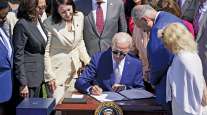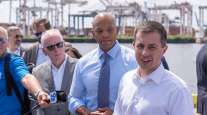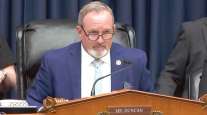Infrastructure Legislation Back on Congress' Radar
President Donald Trump's pledge to bring massive investments in U.S. infrastructure projects showed new signs of life Feb. 17 after lying dormant for weeks, as leading Republican lawmakers said proposals from the administration could be in the offing.
Senate Majority Leader Mitch McConnell, a Republican, told reporters he expects to receive "some kind of recommendation on an infrastructure bill, a subject that we frequently handle on a bipartisan basis," but gave no details or timing.
He has previously voiced concern over adding to budget deficits with a new injection of federal funds for road, bridge and other construction projects such as the ones President Barack Obama secured from Congress in 2009, especially after a major highway funding law was enacted about a year ago.
Some Republicans and Democrats in Congress are increasingly criticizing Trump's administration for being slow to get behind his legislative initiatives during the first month of his presidency.
Trump’s plans to create an infrastructure council led by two New York billionaire friends, developers Richard LeFrak and Steven Roth, have yet to be launched, a spokesman for LeFrak said.
During his presidential campaign, Trump said he would push for a $1 trillion infrastructure program to rebuild roads, bridges, airports and other public works projects. He said he wanted action during the first 100 days of his administration, which now seems unlikely.
The Republican president has talked about creating a tax credit to encourage private sector investment in many of these projects. But Democrats say that would fail to spur enough rebuilding and put taxpayers on the hook for a tax credit to wealthy developers, who they said would build toll roads that taxpayers would then have to pay to use.
Democrats want a more direct federal role in sparking a construction boom.
In a Feb. 14 interview, Republican Rep. Mario Diaz-Balart said he had "no doubt that [infrastructure investment] is a priority for the administration."
Diaz-Balart chairs a House subcommittee that would control the flow of Washington money that might be needed to fund some of the public works projects.
Several lawmakers and aides speculated the initiative could be attached to tax reform legislation that Republicans want to advance this year, but no decisions have been made.
Writing an infrastructure bill involves seven or eight committees, there are complicated tax and spending questions at stake and lawmakers are divided.
There are also questions over what would qualify as an infrastructure project, with rural areas, for example, clamoring for more broadband internet service.
Sen. John Thune, a member of the Republican leadership who chairs the commerce and transportation panel that has a say on any bill, said he had little information on the content or status of legislation.
Asked about McConnell's comments, Thune said, "Maybe he knows more about it since he's married to the secretary of transportation," Elaine Chao.
Distributed by Tribune Content Agency, LLC




